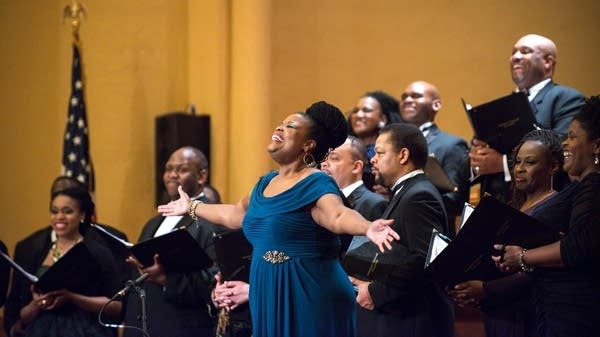Paul Robeson, also known as Big Paul, stood 6 feet, 3 inches tall and had a commanding bass-baritone voice. He was hard to miss — yet he was nearly erased.
Robeson graduated with a law degree from Columbia University. He was a champion of athletics and of socialist causes. He did all of this at a time in America when segregation was legal and lynching was all too common.
In the 1920s and ‘30s, his success as an actor found him traveling extensively and socializing in elite circles. But his passion was sharing spirituals. His goal was to elevate them to the same level as other musical forms. In 1925, he became the first concert singer to present a program made up entirely of songs composed and arranged by Afro-Americans. That concert is considered one of the most important events in American musical history.
Shortly after Robeson returned to the United States in 1939, the FBI began surveillance on him for his work in socialist circles. When he was misquoted in a speech at a Paris peace conference, much of America turned its back on him and he was branded a traitor. Eighty concerts were canceled and you couldn’t find his recordings anywhere. Robeson remained popular outside of America, but his passport was confiscated and he couldn’t travel for eight years.
One of the country’s largest riots happened outside one of his concerts in New York. Police beat Black people with batons, and 200 were injured trying to leave. That led to Robeson’s testimony for the House Committee on Un-American Activities in 1956, when he famously refused to answer questions concerning his political activities and he lectured the committee about Black history and civil rights.
Like many of the news and radio recordings of Robeson, the official recording of those who testified was destroyed. You can learn more in a documentary called Here I Stand, featuring footage of Robeson.
Credits
Host: Vernon Neal
Producer: Dan Nass
Writers: Andrea Blain and Scott Blankenship
Executive Producer: Julie Amacher
Love the music?
Show your support by making a gift to YourClassical.
Each day, we’re here for you with thoughtful streams that set the tone for your day – not to mention the stories and programs that inspire you to new discovery and help you explore the music you love.
YourClassical is available for free, because we are listener-supported public media. Take a moment to make your gift today.
Your Donation
About Rhapsody in Black
Where we turn up the voices of Black artists in the world of classical music, with host Vernon Neal.
Subscribe to the podcast: Apple Podcasts | Spotify | Amazon Music | TuneIn | RSS Feed










